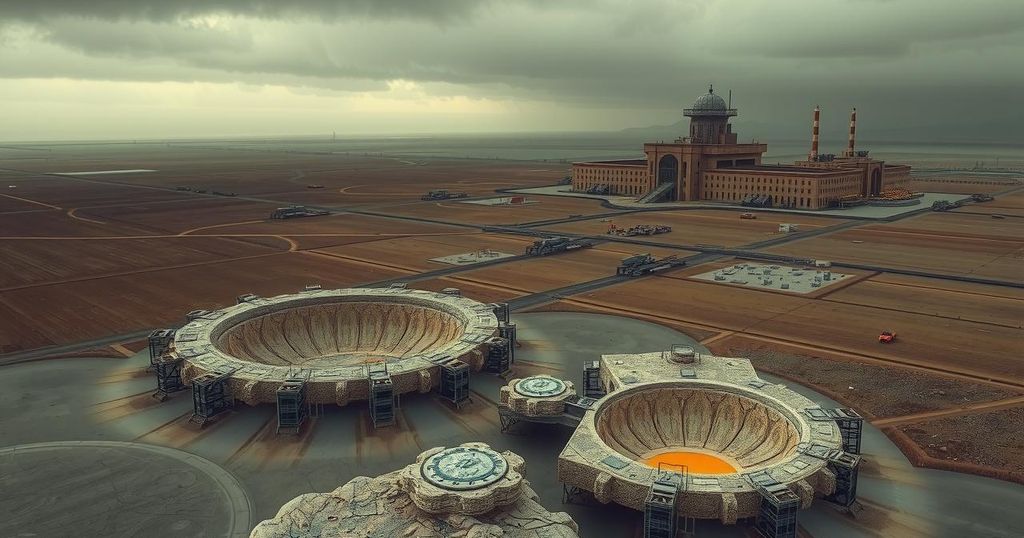Iran Vows Revenge After U.S. Strikes, Tensions Rise Globally
Following U.S. airstrikes on Iran’s nuclear sites, which targeted three key facilities, tensions are running high. Iran has vowed revenge, with various media outlets capturing differing perspectives on the consequences. Diplomatic efforts are underway to prevent further escalation, but the threat of increased hostilities looms. The situation highlights the complexity of U.S. involvement in foreign conflicts, as fears over security and global oil supply mount.
As tensions escalate, Iran has vowed to take revenge following a significant military strike by the United States on its nuclear facilities. The airstrikes targeted three key nuclear sites overnight and have been characterized by U.S. officials as an effort not against Iran directly but against its nuclear program. However, this bold move is surrounded by controversy, described in various outlets as a high-stakes gamble.
Many newspapers are referring to the operation as “Operation Midnight Hammer,” underlining the seriousness of the military action. The Metro highlights the aftermath of the airstrikes, featuring satellite images showing explosions at the Fordo nuclear site stemming from the use of advanced bunker-buster bombs, while Iranian leaders are now warning of severe retribution.
In a striking headline, The Sun proclaims, “Stick it up your bunker,” echoing sentiments from the past during the Falklands War. This reaction underscores the media’s portrayal of Iran as a state threatening global stability. Furthermore, leaders worldwide are urging a return to diplomacy, hoping to avert further conflict.
The Guardian highlights Iran’s intention to retaliate, calling this attack one of the most crucial military interventions in recent history. As President Trump seems to align himself with Israel in this conflict, experts are growing concerned that the escalation could lead to prolonged warfare, undermining his previous commitments to avoid such entanglements.
The Daily Telegraph expresses a similar sentiment, noting that despite Trump’s campaign pledges, he has emerged as a “wartime leader” tasked with addressing the fallout of his administration’s strategies. Meanwhile, Secretary of State Marco Rubio cautions that any act of revenge by Iran could be their “worst mistake.”
Meanwhile, The Times newspaper focuses on the potential ramifications for global oil supplies, the result of Iran’s threatened actions against shipping lanes vital for energy transport. Tehran’s parliament has already voted to block the Strait of Hormuz, a crucial corridor for shipping oil.
In London, the Daily Express reports the growing terror threat as a response to the U.S. actions. Officials fear increased Iranian activities in the UK, with Business Secretary Jonathan Reynolds urging vigilance. The Daily Mail echoes this sentiment, warning that the implications of Iran’s actions could directly affect Britain and its allies.
In a call for restraint, the Daily Mirror features the Prime Minister urging calm after fears arise of a wider conflict. It reflects a backdrop of anxiety and uncertainty as global leaders grapple with the implications of this military offensive.
Reporting on the Pentagon’s briefing on Operation Midnight Hammer, the i Paper depicts the urgency of the situation, while the Daily Star dedicates minimal space to the strikes, seemingly prioritizing celebrity gossip over pressing international news. The starkly varying coverage represents different narrative priorities across the media landscape as the world remains on edge following this military intervention.
The situation remains tense following U.S. airstrikes on Iran’s nuclear facilities, with Iran pledging to retaliate. Different media outlets are framing the consequences of these actions distinctly, reflecting a broad spectrum of concern regarding potential escalations. While some expressions of diplomatic restraint are put forth, fears over global oil supply and security threats abound, highlighting the precarious nature of international relations at this moment. As global leaders call for de-escalation, the future trajectory of U.S.-Iran relations hangs in the balance.
Original Source: www.bbc.com




Post Comment